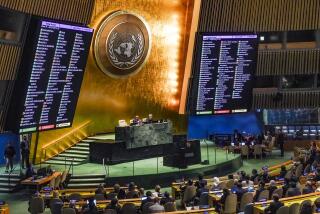Arab League Hedges on Iraq
- Share via
CAIRO — The foreign ministers of a divided Arab League agreed after heated debate Monday to condemn the war against Iraq, but failed to take the much stronger stand that Iraq wanted.
At one point in the debate, Qatar’s foreign minister, Sheik Hamad Jassim ibn Jaber al Thani walked out to tend to “other business,” saying the meeting was “useless.” His comment reflected Arab frustration that the league’s yearlong campaign of diplomacy had produced little except rhetoric.
Political analysts had expected the watered-down final communique, which echoed a prewar resolution passed at a league summit in early March declaring that no member state should participate in attacks against Iraq. Some states -- among them Iraq, Syria, Libya and Lebanon -- argued Monday for stronger language that included a condemnation of U.S. “aggression.”
Neither Arab diplomats nor Arabs at large were under any illusion that Monday’s resolution would have an effect on events unfolding in Iraq. “No one’s going to get the Americans to back off,” said Wassif Mutafa, 35, a Cairo lawyer. “Especially not the Arab League, which can never agree on anything.”
Indeed, the intended audience of the resolution seemed to be the so-called Arab street, where angry, and sometimes violent, protests against the war have shaken undemocratic regimes in several capitals, including Cairo and Amman, Jordan. To defuse the rage, leaders want to convince their people that they are trying to stop the war, even if they are offering the U.S. covert or overt assistance, which ranges from access to military facilities to free aviation fuel and passage through the Suez Canal.
“There is no hope in these rulers,” Iraqi Vice President Taha Yassin Ramadan said in a news conference in Baghdad on the eve of the Cairo meeting. “Every Arab and every Muslim should become a bullet in the face of aggression.”
Iraqi Foreign Minister Naji Sabri, arriving in Cairo after an overland drive from Baghdad to Syria, then a flight from the Syrian capital of Damascus, said he was seeking a “unified stance from the Arabs to condemn this occupation, to stop the war immediately and withdraw the invaders.”
He told reporters that the Arab League should “condemn those who are providing facilities and are contributing to stabbing the Iraqi people in the back.”
Those demands had no chance of acceptance. The security and financial interests of many Arab governments -- among them Egypt, Saudi Arabia and Jordan -- are tied to the U.S. In addition, although Arab governments are sympathetic to the Iraqi people, the country’s leader, Saddam Hussein, is widely reviled. His name wasn’t even uttered during the closed-door debate, league sources said.
Libya’s secretary for African Affairs, Ali Teiki, received lengthy applause from delegates and Arab journalists when he said of the resistance: “We ... salute Iraqi heroism as proof that Arab individuals are capable of confronting the mighty, the coercive and the arrogant. We tell our brothers in Iraq, ‘We are with you.’ ”
Representatives from Qatar, home of the allied command headquarters; Bahrain, where the U.S. Navy’s 5th Fleet is located; and Kuwait, whose bases are a launching pad for the invasion, sat in stony silence. Kuwait tried, without success, to get the Arab League to condemn Iraqi aggression for firing several missiles into the oil-rich state.
More to Read
Sign up for Essential California
The most important California stories and recommendations in your inbox every morning.
You may occasionally receive promotional content from the Los Angeles Times.










